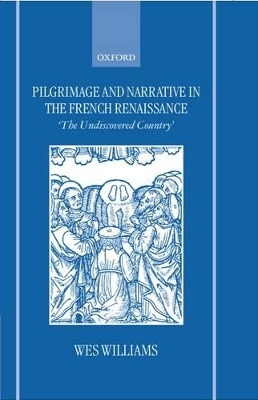
Pilgrimage and Narrative in the French Renaissance
`The Undiscovered Country'
Seiten
1998
Oxford University Press (Verlag)
978-0-19-815940-7 (ISBN)
Oxford University Press (Verlag)
978-0-19-815940-7 (ISBN)
This text studies the place and meaning of pilgrimage in European Renaissance culture. It offers perspectives on a variety of canonical writers, exploring themes in Renaissance pilgrimage and the literary formation of the subjective narrative voice and its relationship to rituals and practices.
This is the first full-length study of the place and meaning of pilgrimage in European Renaissance culture. It makes new material available and also provides fresh perspectives on canonical writers such as Rabelais, Montaigne, Margurite de Navarre, Erasmus, Petrarch, Augustine, and Gregory of Nyssa. Wes Williams undertakes a bold exploration of various interlinking themes in Renaissance pilgrimage: the location, representation, and politics of the sacred, together with the experience of the everyday, the extraordinary, the religious, and the represented. Williams also examines the literary formation of the subjective narrative voice in his texts, and its relationship to the rituals and practices he reviews. This wide-ranging and timely new work aims both to gain a sense of the shapes of pilgrim experience in the Renaissance and to question the ways in which recent theoretical and historical research in the area has determined the differences between fictional worlds and the real.
This is the first full-length study of the place and meaning of pilgrimage in European Renaissance culture. It makes new material available and also provides fresh perspectives on canonical writers such as Rabelais, Montaigne, Margurite de Navarre, Erasmus, Petrarch, Augustine, and Gregory of Nyssa. Wes Williams undertakes a bold exploration of various interlinking themes in Renaissance pilgrimage: the location, representation, and politics of the sacred, together with the experience of the everyday, the extraordinary, the religious, and the represented. Williams also examines the literary formation of the subjective narrative voice in his texts, and its relationship to the rituals and practices he reviews. This wide-ranging and timely new work aims both to gain a sense of the shapes of pilgrim experience in the Renaissance and to question the ways in which recent theoretical and historical research in the area has determined the differences between fictional worlds and the real.
Introduction ; Part I: Coming to Terms: The Subject of Pilgrimage [Renaissance dialogues, guides to pilgrimage, arguments against it] ; Part II: Being There: The Experience of Pilgrimage [narratives of pilgrimage] ; Part III: Forms of Return: The Afterlife of Pilgrimage [Columbus and others; pilgrims' fantasies and fears, professional pilgrims] ; Conclusion ; Bibliography ; Index
| Erscheint lt. Verlag | 1.1.1999 |
|---|---|
| Zusatzinfo | 2 halftones |
| Verlagsort | Oxford |
| Sprache | englisch |
| Maße | 145 x 224 mm |
| Gewicht | 553 g |
| Themenwelt | Geschichte ► Allgemeine Geschichte ► Neuzeit (bis 1918) |
| Geisteswissenschaften ► Geschichte ► Regional- / Ländergeschichte | |
| Religion / Theologie ► Christentum ► Kirchengeschichte | |
| Religion / Theologie ► Christentum ► Liturgik / Homiletik | |
| Geisteswissenschaften ► Sprach- / Literaturwissenschaft ► Anglistik / Amerikanistik | |
| Geisteswissenschaften ► Sprach- / Literaturwissenschaft ► Literaturwissenschaft | |
| Sozialwissenschaften | |
| ISBN-10 | 0-19-815940-4 / 0198159404 |
| ISBN-13 | 978-0-19-815940-7 / 9780198159407 |
| Zustand | Neuware |
| Haben Sie eine Frage zum Produkt? |
Mehr entdecken
aus dem Bereich
aus dem Bereich
Europa 1848/49 und der Kampf für eine neue Welt
Buch | Hardcover (2023)
DVA (Verlag)
48,00 €
Giordano Bruno - ein ketzerisches Leben
Buch | Hardcover (2024)
C.H.Beck (Verlag)
29,90 €


